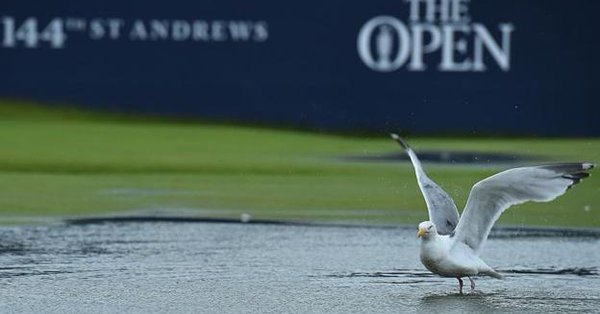Climate change driving golf off the green

Wetter winters and coastal erosion linked to climate change are threatening the sport of golf, according to a new report that University of Leeds scientists have contributed to.
Professor Piers Forster, Director of the Priestley International Centre for Climate, provided evidence to the report by the Climate Coalition, along with research associate Kate Sambrook.
“We’ve seen six of the seven wettest years on record since 2000 and record-breaking wet winters in 2014 and 2016 with 150 per cent of the normal rainfall,” Prof Forster said. “That, combined with rising sea levels and increased storm surges, means that climate change is already affecting the historic game of golf in its birthplace.
“Without cutting the carbon emissions driving climate change, sea levels will rise by over a metre and extremely wet winters will become the norm. Many aspects of our lives including the game of golf would struggle to adapt to such a changed world.”
Climate change is making extreme weather worse, causing more courses to be closed more often and for longer periods. The year 2016/17 saw 20% less playing time at courses across the Greater Glasgow area compared to ten years before.
The report, Game Changer, is supported by the R&A, the sport’s governing body in the UK. It reveals that in the Glasgow area alone, 2016/17 saw a 20% reduction in playing time compared to 2006/07.
Steve Isaac, Director of golf course management at the R&A, said: “ There is no question it’s becoming a huge factor. I believe golf is more impacted by climate change than any other sport aside from skiing. We are feeling it now with increases in unplayable holes, winter course closures and disruption to professional tournaments. And the future threats are very real.”
One of the oldest courses in the world, Montrose, has been badly affected. In the last 30 years, the North Sea has advanced 70 metres towards the course, forcing the course to realign some holes and abandon others. But it is not just Montrose that is endangered—one-sixth of Scotland’s golf courses are located on the coast, and are at risk from rising sea levels. Only a small increase in sea-level rise would jeopardise all of the world’s links courses by 2100.
Climate change impacts on football and cricket
The report also highlights the impact of climate change on football, citing the examples of Bromley Heath United FC calling off matches for three months due to worsening weather and £48m investment by the FA in hundreds of specially-adapted turf pitches. The impact is particularly acute at grassroots level where the average club is losing five weeks every season due to bad weather.
Cricket is also said to be affected, with 27% of England’s home One Day Internationals being played with reduced overs since 2000 due to rain disruptions, and the rate of rain-affected matches doubling since 2011. Bad weather has cost the England and Wales Cricket Board £1m in emergency grants during 2016 and £1.6m in 2017. This trend has forced the governing body to set aside £2.5m a year for to help recreational clubs keep playing.
The report is being published as part of The Climate Coalition’s Show The Love campaign which celebrates all that we love but could lose to climate change – whether sports rained-off or natural beauty spots damaged by increased flooding. These events are a timely reminder of the far graver threats posed by climate change to every one of us, both in the UK and overseas. The Coalition is made up of more than 100 organisations representing over 15 million people, ranging from groups such as WWF and the Women’s Institute, and aid agencies such as CAFOD, Christian Aid and Oxfam.
Tanya Steele, CEO of WWF and a member of The Climate Coalition, said:
“Climate change won’t leave any aspect of our lives untouched, even the sports we love. Our report shows that golf, football and cricket – three sports at the heart of British culture – will all be irrevocably changed. This should be another wake-up call for all of us. We must get our emissions down and meet our Paris Climate Change Agreement targets.”
Press coverage of the report, published Wednesday 7 February, has been extensive, with articles in Reuters, Breitbart, Daily Express, The National, Jakarta Post, The Herald, The Telegraph, and BBC Sports online.
The report was also featured on BBC Radio 5 Live and Kate Sambrook was interviewed live on air on Good Morning Scotland for BBC Radio Scotland.
